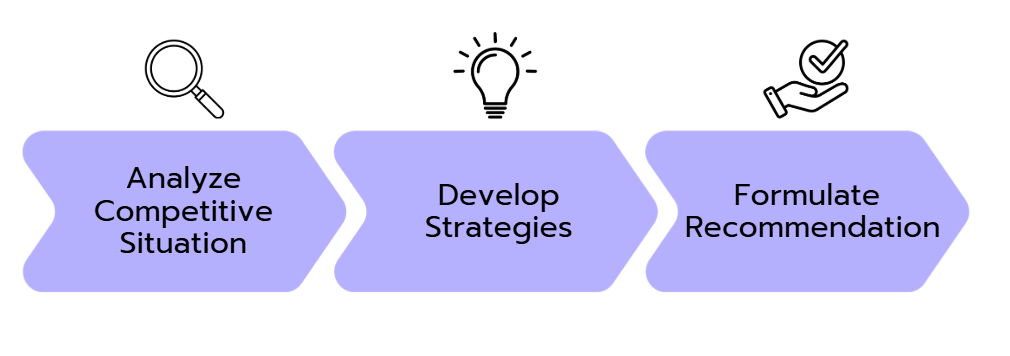Competitive response cases are a special type of case you might encounter in your case interview. In these cases, you either have to analyze how your client should respond to a competitor's strategy or predict how competitors will react to your client's strategy. This type of case helps you understand competitive dynamics better and develop effective strategies for competitive responses.
Competitive Response
How to Approach Competitive Response Cases
To successfully tackle a competitive response case, follow these three steps:

1. Analyze the Current Competitive Situation.
Before giving any recommendations, it’s essential to fully understand the current competitive situation. Key aspects to investigate include:
- Description of the competitor’s product: What exactly does the new product offer? How does it differ from your client's existing products?
- Customer relevance: How important are the new features to customers? How do they influence purchasing decisions?
- Competitor’s goals: What is the competitor trying to achieve with the new product? Are they aiming for higher prices or trying to gain market share?
- Motivation behind the launch: Why did the competitor introduce this product? Has customer preference changed, or are there new technological advancements?
- Target market: Which market segment is targeted by the new product, and how is this segment expected to react?
- Client’s resources: Does your client have resources or capabilities that could be used to respond to the new product, such as expertise, financial resources, production facilities, or strategic partnerships?
2. Develop Strategies to Respond to the Competitive Situation.
Based on your analysis, consider various strategic options. Possible responses to the introduction of a new competitive product could include:

- Optimize the product: Think about how to make the current product more attractive. This could be through product changes, market repositioning, or increased marketing efforts. Strengthening customer loyalty or increasing switching costs could also be effective.
- Develop a new product: Consider introducing a new product that competes with the competitor’s product. Alternatively, think about acquiring or partnering with the competitor or imitating their successful product features.
- Wait: In some cases, it might be wise to wait and gather more information before making a final decision. This strategy could be useful if you need more detailed market analysis or additional developments.
3. Formulate a Recommendation.
Based on your analysis and evaluated strategies, formulate your final recommendation. Consider both the short-term and long-term impacts of the proposed actions on your client's competitiveness and success.
Key Insights on Competitive Response Cases
💡 Understand and analyze the differences between the competitor's new product and your client’s product, as well as the relevant customer needs.
💡 There are various response options such as product optimization, new product development, or waiting. Choose the right strategy based on your analysis.
💡 Consider both short-term and long-term impacts on the client's competitive position and strategic goals.
By following this structured approach, you can demonstrate in your case interview that you not only understand the competitive situation but also provide well-founded and strategic recommendations.
